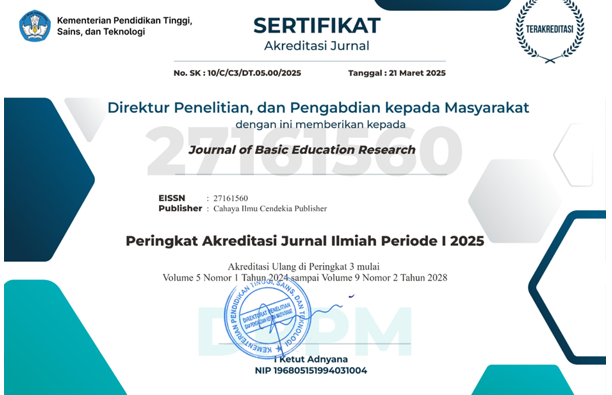A Study of Thematic Learning in Discipline Character Cases
Abstract
This study aims to describe thematic learning that has a correlation in helping the formation of disciplinary character in students. The method used in this research is a qualitative method to get a deeper understanding of a problem. . The subjects of this study were students in class III of State Elementary School 166/1 Olak Rambahan, totaling 11 students who were obtained using random sampling technique. Instruments of data collection were carried out through observation (observation of educators and students) and conducting interviews with students. Data analysis used interviews and observations. Based on the results of the research that has been done, it can be concluded that the thematic learning applied to class III Elementary School will have a tremendous impact on educators, students and the school environment.
References
I. Padangsidimpuan Afridapane, “Belajar dan pembelajaran aprida pane muhammad darwis dasopang,” Jurnal Kajian Ilmu-ilmu Keislaman, vol. 3, no. 2, 2017.
L. Arfani, “Mengurai hakikat pendidikan, belajar dan pembelajaran,” Pelita Bangsa Pelestari Pancasila, vol. 11, no. 2.
M S. Hanafy, “Konsep belajar dan pembelajaran,” Lentera Pendidikan: Jurnal Ilmu Tarbiyah dan Keguruan, vol. 17, no. 1, pp. 66-79, 2014.
R. Anwar, “Hal-hal yang mendasari penerapan Kurikulum 2013. Humaniora, vol. 5, no. 1, pp. 97-106, 2014.
N. Yuniasih., I. Ladamay., and D. Wahyuningtyas, “Analisis pembelajaran tematik pada kurikulum 2013 di SDN Tanjungrejo 1 Malang,” Mimbar Sekolah Dasar, vol. 1, no. 2, pp. 148-152, 2014.
P. N. Sinambela, “Kurikulum 2013 dan implementasinya dalam pembelajaran,” Generasi Kampus, vol. 6, no. 2, 2017.
Y. M. Rahayu, “Pengaruh perubahan kurikulum 2013 terhadap perkembangan peserta didik,” LOGIKA Jurnal Ilmiah Lemlit Unswagati Cirebon, vol. 18, no. 3, pp. 22-42, 2017.
B. B. Yusuf, “Konsep dan indikator pembelajaran efektif,” Jurnal kajian pembelajaran dan keilmuan, vol. 1, no. 2, pp. 13-20, 2017.
P. Purwadhi, “Pembelajaran inovatif dalam pembentukan karakter siswa,” Mimbar Pendidikan, vol. 4, no. 1, pp. 21-34, 2019.
H. Assidiqi, “Membentuk karakter peserta didik melalui model pembelajaran search, solve, create, and share,” Math Didactic: Jurnal Pendidikan Matematika, vol. 1, no. 1, pp. 45-55, 2015.
A. Hermawan, “Mengetahui karakteristik peserta didik untuk memaksimalkan pembelajaran,” Jurnal Pendidikan Karakter, vol. 7, no. 1, pp. 14-25, 2014.
D. Djumali, “Pendidikan Karakter Dalam Proses Pembelajaran,” 2018.
F. E. Dole, “Pengaruh pendidikan karakter terhadap kedisiplinan peserta didik di sekolah dasar,” Edukatif: Jurnal Ilmu Pendidikan, vol. 3, no. 6, pp. 3675-3688, 2021.
S. Suradi, “Pembentukan karakter siswa melalui penerapan disiplin tata tertib sekolah. Briliant: Jurnal Riset dan Konseptual, vol. 2, no. 4, pp. 522-533, 2017.
F. Annisa, “Penanaman nilai-nilai pendidikan karakter disiplin pada siswa Sekolah Dasar,” Perspektif Pendidikan Dan Keguruan, vol. 10, no. 1, pp. 69-74, 2019.
E. Kusniati., and C. H. Mahfud, “Penerapan model problem based learning untuk meningkatkan nilai karakter disiplin peserta didik di sekolah dasar,”. Jurnal Pendidikan Dasar, vol. 7, no. 1, 2019.
M. R. Fadli, “Memahami desain metode penelitian kualitatif,” Humanika, Kajian Ilmiah Mata Kuliah Umum, vol. 21, no. 1, pp. 33-54, 2021.
D. W. Ekowati, “Pelaksanaan penilaian pembelajaran tematik di sd purwantoro 1 kota malang dan mi nurul islam tajinan Kabupaten Malang. Premiere Educandum: Jurnal Pendidikan Dasar dan Pembelajaran, vol. 4, no. 2, 2016.
H, Karli, “Penerapan pembelajaran tematik SD di Indonesia,” EduHumaniora Jurnal Pendidikan Dasar Kampus Cibiru, vol. 2, no. 1, 2015.
N. A. Sari., and Y. Yuniastuti, “Penerapan pembelajaran tematik terpadu di sekolah dasar,” Jurnal Pendidikan: Teori, Penelitian, Dan Pengembangan, vol. 3, 12, pp. 1572-1582, 2018.
R. D. A. Kinesti., K. Ummatin., I. Zumaroh., N. C. Nisa., I. Nugrahen., and M. A. Pratiwi, “Penerapan nilai karakter kedisiplinan dalam meningkatkan hasil belajar siswa di SD Al-Ma’soem. Jurnal Jendela Pendidikan, vol. 1, no. 4, pp. 286-292, 2021.
Copyright (c) 2023 Nursakinah Nursakinah, Jauhar Jauhar

This work is licensed under a Creative Commons Attribution-NonCommercial 4.0 International License.
Authors who publish with this journal agree to the following terms:
- Authors retain copyright and acknowledge that the Journal of Basic Education Research is the first publisher licensed under a Creative Commons Attribution 4.0 International License.
- Authors are able to enter into separate, additional contractual arrangements for the non-exclusive distribution of the journal's published version of the work (e.g., post it to an institutional repository or publish it in a book), with an acknowledgment of its initial publication in this journal.
- Authors are permitted and encouraged to post their work online (e.g., in institutional repositories or on their website) prior to and during the submission process, as it can lead to productive exchanges and earlier and greater citation of published work.





.png)


.png)
.png)


















